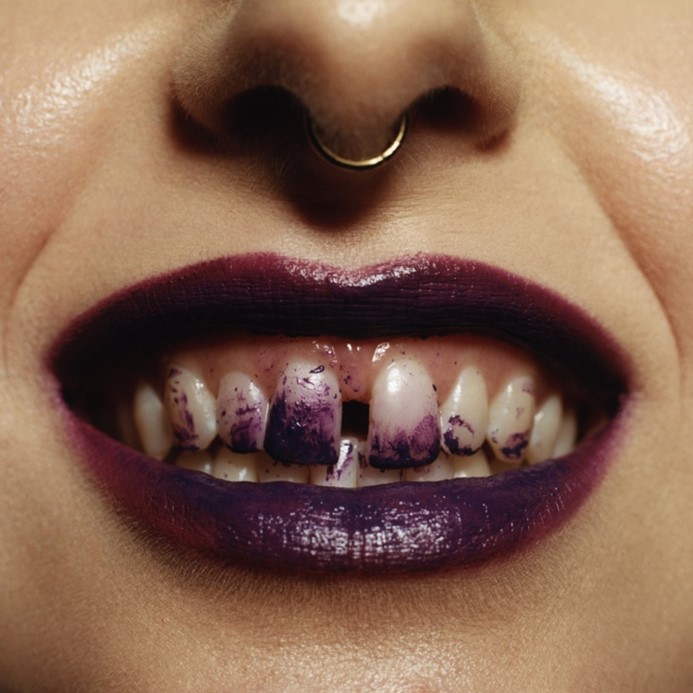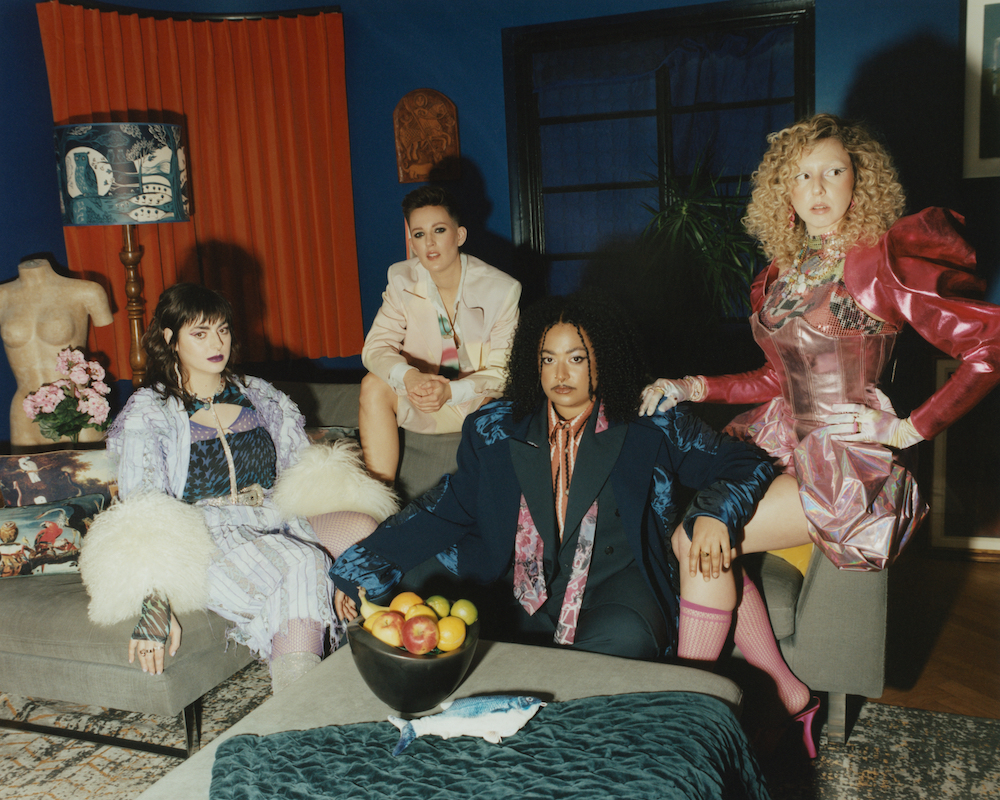SCROLL DOWN FOR THE ENGLISH VERSION!
Ciao, è un piacere avervi su SpazioRock! Come state?
Grazie a voi! Abbiamo dei ricordi molto belli del nostro unico show a Milano e non vediamo davvero l’ora di tornare a suonare in Italia.
Il vostro nuovo album “Doom Loop” è appena stato pubblicato. Come vi sentite a riguardo? Com’è stato accolto fino ad ora?
Anya: Siamo molto felici di poter condividere il prossimo stadio evolutivo della nostra band con un album di cui siamo immensamente orgoglios*! Abbiamo già ricevuto dei feedback davvero positivi ed è bello sapere che i nostri fan sono così vicini a queste tematiche e a questo tipo di musica.
Mimi: Abbiamo iniziato a registrare “Doom Loop” esattamente un anno prima della sua pubblicazione. È davvero una bella sensazione sapere che ora è lì fuori, nel mondo. Abbiamo lavorato sodo su questo album ed è bellissimo sapere che la gente lo sta ascoltando e supportando. Per quanto mi riguarda, mi ha fatto molto piacere vedere su Instagram tutti i post delle persone che ci seguono. I giornalisti che hanno scritto recensioni dell’album l’hanno compreso, hanno capito che parla di temi molto seri, ma con un po’ di humor e di gioia queer.
“Doom Loop” è il vostro secondo album. Come avete iniziato a lavorarci e perchè l’avete realizzato in questo momento in particolare? In altre parole, quali eventi e sentimenti vi hanno portat* a mettere insieme questo album? Ci sono stati anche dei cambiamenti all’interno della band negli ultimi anni.
Mimi: Quando pubblicammo il nostro primo album, il timing fu pessimo, e per colpa della pandemia non riusciammo a portarlo in tour. Abbiamo molto da dire, e ogni artista durante la propria carriera pensa sempre: “chissà cosa succederà”. Abbiamo accolto Ishmael come l* nostr* nuov* cantante, e, come artista e performer, ha dato un grande contributo alla band. “Doom Loop” ci rappresententa nella nostra osservazione curiosa della mascolinità tossica, del “bravo ragazzo”, dell’incel. Musicalmente e tematicamente è un’evoluzione per noi.

In “Doom Loop” affrontate i temi della complessità della questione di genere, della mascolinità tossica e della diversità delle identitià di genere. È stato difficile mettere in parole e musica dei temi così dolorosi, ma allo stesso tempo liberatori?
Ishmael: Credo che quello che hai detto, chiamandola “questione” di genere, centri proprio il problema, visto che la “questione” di fatto è la mancanza di conoscenza e immaginazione della società Occidentale. Il patriarcato non è un tema sconosciuto socialmente e accademicamente, ma la gente va sulla difensiva anche quando solo se ne parla, soprattutto quando questa discussione verte sul rinunciare allo spazio che si ha e alla responsabilizzazione. Questo album parla di genere in quanto tema universale, non perché sono solo le persone trans a soffrire e a essere schiacciate dall’ideologia di genere vittoriana, soffrono anche gli uomini cisgender. “Sometimes I Do Get Lonely, Yeah” è un racconto empatico di un incel che si radicalizza, un tema che la gente non si aspetterebbe di sentire da una band punk femminista queer. Studiare quel tema è doloroso perchè la retorica e la violenza sono dirette a noi, ma non conoscere qualcosa non fa sparire quel qualcosa. Guardare ai problemi della società con coraggio è importante per deromanticizzare i comportamenti più mostruosi e osservarli da un punto di vista socio-politico che comprenda anche che l’isolamento e la povertà sono parte della realtà. Brani come “Femme Boi”, invece, derivano da un’esperienza vissuta in quanto persona transmasc: sono brani sfacciati e la scrittura di questi pezzi è stata organica e sentita.
Il punk è tradizionalmente un mezzo per la veicolazione di messaggi forti, sovversivi, che sfondano i confini. In questo caso, è anche una metafora di queer. Cosa significa per voi “essere punk”?
Lucy: È una domanda interessante, ci pensiamo molto spesso! Non ci identifichiamo molto con la maggior parte di quello che viene comunemente etichettato come “punk”, mi riferisco nello specifico al concetto di distruzione fine a sé stessa, all’attitudine da adolescente anarchico “non mi interessa cosa pensi di me, faccio comunque quello che voglio”. È una cosa da ragazzino adolescente. Punk per noi significa comunità e azione collettiva, significa prendersi cura l’uno dell’altro e significa solidarità intersezionale, per contrastare l’oppressione violenta che subiscono molte persone, da tanti punti di vista. Abbiamo sviluppato il nostro modo di pensare a questo tema proprio lavorando su questo album, e, vedendo nello spirito punk il rifiuto del pensiero che ci hanno inculcato, di ciò che ci hanno fatto credere, per noi il punk è empatico, fa lo sforzo di capire perché la nostra società è così frammentata.
Qual è il modo di spezzare il doom loop (circolo vizioso, ndr) di cui parlate nell’album?
Anya: È facile trovare problemi nel mondo e il punk ha sempre voluto contrastare l’oppressione, parliamo di questo in circa metà album. Ma Dream Nails significa anche positività e soluzioni, oltre che ira e rabbia. Noi consigliamo di spezzare il circolo vizioso attraverso la gioia, l’empatia, la cura e la compassione. Brani come “Time Ain’t No Healer” e “Femme Boi” mostrano una visione della realtà alternativa, nella quale è possibile uscire da vecchi pattern che non ci servono più.
Per me, questo album è un manifesto, e Dream Nails è il veicolo di un messaggio politico. Come fa una persona a prendere parte a questo movimento? Cosa possiamo fare nella nostra vita di tutti i giorni per diffondere questi messaggi e questa mentalità?
Lucy: Ottima domanda! Penso che sia importante mettere in chiaro il fatto che l’azione politica e il vero cambiamento non derivino solo dalla musica (indipendentemente da quanto sia catchy una canzone!). Questo tipo di cambiamento deriva da un lavoro politico in prima linea instancabile e ingrato, che spesso viene fatto a livello locale, dalle radici. Ogni volta in cui sono stata in Italia, sono rimasta impressionata dal coinvolgimento in questo tipo di lavoro, sono stata colpita in particolare da Bologna, che so essere una città molto radicale. In ogni caso, la vita è dura e le persone non trovano sempre il tempo di dedicarsi a questo tipo di lavoro. Credo che i social media siano un grande strumento per condividere questo tipo di informazioni. E non dobbiamo dimenticare di condividere anche la musica! La cultura è sempre il primo segnale di cambiamento sociale. L’arte è un’arma segreta!

Partendo da “Good Guy” e arrivando “Time Ain’t No Healer” esplorate anche tantissime sfumature sonore. Come avete gestito la parte di composizione?
Mimi: Ognuno dei quattro membri di questa band porta un contributo diverso. Abbiamo iniziato a scrivere i brani di “Doom Loop” circa un anno prima di iniziare a registrarlo, quindi hanno superato un bella fase di “test” interno. Dalle demo di prova, alle demo in studio, ci abbiamo lavorato molto. In studio abbiamo lavorato più sulle rifiniture. “Good Guy” apre l’album come in modo esplosivo, con delle sonorità molto familiari a Dream Nails, con l’aggiunta di nuovi sintetizzatori nel mix. L’album si chiude su note diverse, inedite per noi, ma è un balsamo che lenisce da tutto ciò che abbiamo passato insieme durante il viaggio contenuto in questo album. Rompe il circolo vizioso: “L’unico modo per uscirne è attraversarlo”.
Come vi siete ritrovat* a lavorare con Ross Orton e com’è andata questa collaborazione?
Anya: Siamo molto fan del primo album di Amyl & The Sniffers e anche del primo EP di Yard Act’s, entrambi prodotti da Ross. Ci siamo mess* in contatto con lui e abbiamo fatto due chiacchiere, per poi arrivare alla conclusione che ad entrambi sarebbe piaciuto fare un album insieme, e quindi l’abbiamo fatto! Ross ha il suo studio a Sheffield, quindi siamo andat*da lui e siamo rimast* lì per tre settimane insieme ad un’amica di famiglia di Anya, Linda, che è un’accademica che si occupa di femminismo e spacca i culi! Andavamo ogni giorno in studio ascoltando “Break Stuff” dei Limp Bizkit per prepararci ad entrare in studio! Ross ha un ottimo orecchio per la produzione della batteria e ci ha aiutat* a definire e a rifinire i suoni di chitarra e basso per “Doom Loop”, cosa che abbiamo apprezzato davvero molto. Siamo davvero soddisfatt* delle scelte sonore di questo album.
Vi va di lasciare un messaggio a nostri lettori?
THE ONLY WAY OUT IS THROUGH!
ENGLISH VERSION
Hi, it’s great to have you! How are you doing?
Great to be here! We remember our one and only show in Milan fondly and we are just desperate to play more shows in Italy to be honest.
Your new album “Doom Loop” has just been released. How do you feel about it? How is it being received?
Anya: We are so excited to finally be able to share the next evolutionary stage of our band, with a record we are immensely proud of! We have had a lot of really positive reviews already and it feels really good to know that our fans are relating so much to the themes and to the music.
Mimi: We were in the studio recording Doom Loop exactly a year before it was released. It feels great to have it out in the world, we’ve worked really hard for this release and it’s amazing to have people listening to it, and supporting it. I’ve personally really enjoyed seeing peoples instagram posts about the album! The journalists reviewing the album have got it, that it deals with serious themes but with some humor and queer joy at the same time.
“Doom Loop” is your sophomore album. How did you start working on it, and why did you put it together at this specific moment? In other words, what events and feelings led you to put this record together? There also have been some changes in the band in the past years.
Mimi: When we released our first album it was unfortunate timing, and due to the pandemic, we weren’t able to properly tour it. We have a lot to say, and in any artists career, you’re always thinking “what’s next?”. We welcomed Ishmael as our new frontman and being a performer and artist in their own right, they brought so much to the band. Doom Loop is us being a curious observer to toxic masculinity, the good guy, the incel. It’s both musically and thematically an evolution of Dream Nails.
In “Doom Loop” you go through the complexity of the gender issue, of toxic masculinity and the diversity of gender identities. How hard was it to put into words and music such painful but at the same time freeing concepts?
Ishmael: I think what you’ve said here has nailed the problem calling it a gender ‘issue’ when the issue is western society’s lack of knowledge and imagination. Patriarchy isn’t a foreign subject socially and academically but people feel defensive still talking about it especially when it involves them giving up space or holding themselves accountable. This album is exploring gender as universal subject it’s not just trans people who suffer under Victorian gender ideology’s it’s cis men too. In sometimes I do get lonely yeah we explore an empathetic retelling of an incel being radicalised something most people wouldn’t expect from a feminist queer punk band. And researching that subject is painful because the rhetoric and violence is aimed directly at us but not knowing about something doesn’t make it go away. Looking at the problems I’m society face on is so important to deromatisize monstrous behavior and look at it from a socio political lense on the reality of isolation and poverty. Songs like femme boi came from a lived experience as a trans masculine person. And it’s joyess and cheeky so writing it came from a place that’s organic and heartfelt.
Punk has always been a perfect mean of conveying strong, subversive messages, of overcoming boundaries, in this case it can be also a metaphor for queer. What does being punk mean to you?
Lucy: This is interesting and something we think about a lot! We don’t identify very strongly with much of what has been come to be known as ‘punk’ – namely the destruction for destructions sake, and the anarcho-adolesent ‘I don’t care what you think of me I will do what I want’ attitude. It feels stinky teenage boy. Punk for us is about community and collective action, it’s about taking care of each other and intersectional solidarity in the face of violent oppression to many, from many angles. We’ve developed our thinking on this through working on this album, and in seeing punk spirit as refusing what we are fed or made to believe, we see that it is punk to be empathetic, to make the effort to understand why we are so splintered as a society.
What is the way to break the doom loop you are talking about in the record?
Anya: it’s easy to identify problems in the world and punk has always been about kicking back at repression, and we deal with that in the first half the record. But Dream Nails has always been about positivity and solutions as well as anger and rage. So we suggest breaking out of the doom loop involves joy, empathy, healing and compassion. Tracks like Time Ain’t No Healer and Femme Boi show an alternative view of reality where we can move out of old patterns that no longer serve us.
I’d say that this record embodies a manifesto, that Dream Nails are a veichle of a political message. How can anyone take part in this movement? What would you say we can do in our everyday lives to spread this message and this way of thinking?
Lucy: Great question! I think that it’s important to make very clear that political action and real change does not come from solely from music (no matter how catchy that song may be 😉 ! ) This kind of change comes from tireless and thankless frontline political work, often on a grassroots and local level. Whenever I’ve been in Italy I’ve always been really impressed by the involvement in this kind of work – I was especially struck by this in Bologna which I know is a very radical city. However, life is hard and people don’t always have time to give to this kind of work. I think social media can be a great tool for sharing info. And we can’t forget sharing music too! culture is always the first marker of social change and swing – art is a stealth weapon!
Starting from “Good Guy” and ending with “Time Ain’t No Healer” you explore many shades of sounds as well. How did you manage the music writing?
Mimi: All four members of this band bring something different to the table. We started writing the songs for Doom Loop about one year before recording. They went through some pretty vigorous ‘testing’ in our bangers factory. From rehearsal demos, to proper studio demos, we worked on them a lot. In the studio, we did more refining. Good Guy starts the album off with a bang, a familiar Dream Nails sound, with new synthesizers mixed in. The album ends on a different note, something we’ve never done before, but it is a soothing balm to what we’ve been through on the album journey together. It’s breaking the ‘Doom Loopl, “The only way out is through”.
How did you end up working with Ross Orton and how was this collaboration like?
Anya: We were big fans of the production on Amyl & The Sniffers first record, and also Yard Act’s first EP, both of which were produced by Ross. We reached out and had a chat with him, decided we’d all like to mutually make a record together, and went and did it! Ross has his own studio in Sheffield so we went up and stayed for three weeks with a family friend of Anya’s called Linda, who is a badass feminist academic! Each day we drove to the studio and listened to Break Stuff by Limp Bizkit to get us ready for the studio! Ross has a really good ear for drum production and helped us define and refine the guitar and bass sounds for Doom Loop, for which we are very appreciative. We are very happy with the sonic choices on the album.
Would you like to leave a message to our readers?
THE ONLY WAY OUT IS THROUGH!








